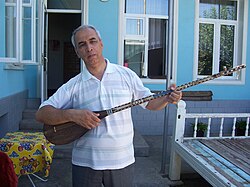Dutar
 |
|
| Classification | |
|---|---|
| Related instruments | |
The dutar (Persian: دوتار, Tajik: дутор, Uyghur: دۇتتار, Дуттар, ULY: Duttar, Uzbek: dutor, Chinese: 都塔尔) (also dotar or doutar) is a traditional long-necked two-stringed lute found in Iran and Central Asia. Its name comes from the Persian word for "two strings", دو تار dotār (< دو do "two", تار tār "string"), although the Herati dutar of Afghanistan has fourteen strings. When played, the strings are usually plucked by the Uyghurs of Western China and strummed and plucked by the Tajiks, Turkmen, Uzbeks. Related instruments include the Kazakh dombra. The Dutar is also an important instrument among the Kurds of Khorasan amongst whom Haj Ghorban Soleimani of Quchan was a noted virtuoso. In Kormanji one who plays the dutar is known as a bakci (bakhshi), while in Azeri the term is ashiq. Khorasan bakhshi music is recognized on the Representative List of the Intangible Cultural Heritage of Humanity.
...
Wikipedia
